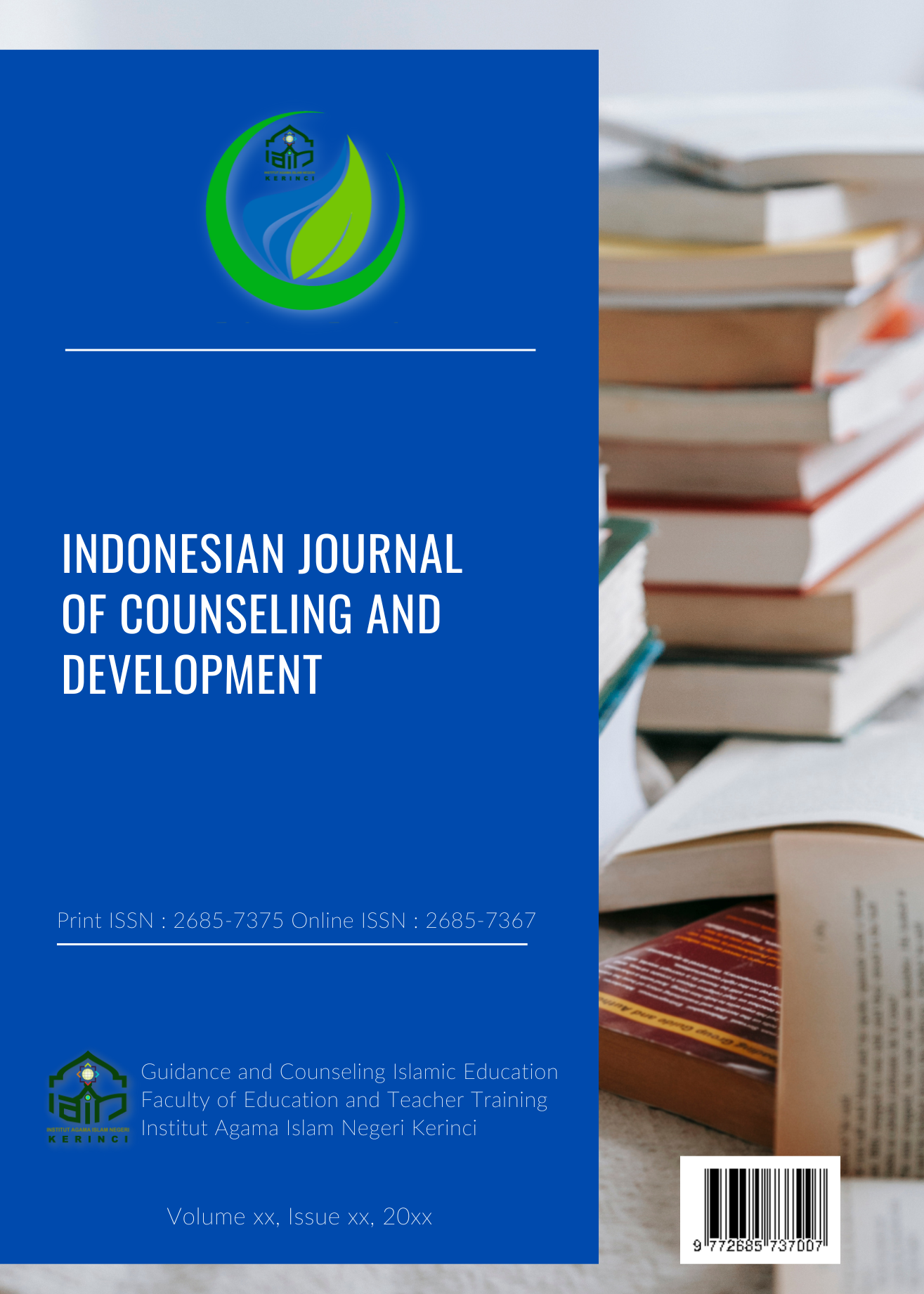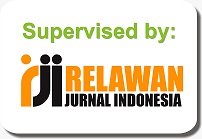Peningkatan Komunikasi Interpersonal melalui Bimbingan Kelompok Teknik Role Playing pada Siswa SMKN 1 Surabaya
Abstract
Interpersonal communication is an important thing that cannot be separated from the process of life both in the residential environment and the school environment. Low interpersonal communication will affect the difficulty in establishing relationships as social beings. This study is intended to improve interpersonal communication with group guidance using role-playing techniques. This study is a classroom action research using the purposive sampling method, the sample used was 35 students in class X PSPT 1. The focus of this study is on interpersonal communication of students at SMK N 1 Surabaya. Data collection through observation, interviews, and interpersonal communication scales, while data analysis uses graphic visual analysis techniques. The results of the study showed that before the service was given, there were 20% of students who had low interpersonal communication, 65.71% were moderate and 14.29% were high. After being given service intervention, there was an increase in the strength of interpersonal communication, this was evidenced by the results of the post-test at the end of the cycle, the number of students with low interpersonal communication decreased drastically to 2.86%, while students with moderate interpersonal communication increased to 37.14%, and the high category increased to 60%. Role-playing techniques have been proven effective in improving students' interpersonal communication skills, helping them interact better with peers, teachers, and the school environment
Downloads
References
Al Fariz, M. R., Hamidah, H., & Manalullaili, M. (2024). Strategi Komunikasi Interpersonal Ketua dan Anggota dalam Menanamkan Nilai Kerukunan pada Paguyuban Sambirejo Rukun (PSR) di Desa Sambirejo, Kecamatan Selupu Rejang. Jurnal Bisnis dan Komunikasi Digital, 1(2), 11. https://doi.org/10.47134/jbkd.v1i2.2297
Alfaiz, A., Fauzi, Y. M., Yuzarion, Y., Yandri, H., Nofrita, N., Murisal, M., ... & Sari, A. K. (2023). The synthesis of spiritual cognitive behavioral approach to understanding and modifying human behavior. Psikis: Jurnal Psikologi Islami, 9(2), 220-235.
Amelisastri, W., Yandri, H., & Kholidin, F. I. (2024). Fear of Missing Out (FOMO): Exploring Its Relationship with Self-Control and Self-Regulation in College Students. Buletin Konseling Inovatif, 4(2), 122-132.
Ani, J., Lumanauw, B., & Tampenawas, J. (2022). Pengaruh citra merek, promosi dan kualitas layanan terhadap keputusan pembelian konsumen pada e-commerce Tokopedia di kota Manado. Jurnal EMBA: Jurnal Riset Ekonomi, Manajemen, Bisnis dan sAkuntansi, 10(1), 663-674.
Aprilia, R., Madihah, H., & Susanto, D. (2017). Meningkatkan Kemampuan Komunikasi Interpersonal Siswa Melalui Layanan Bimbingan Kelompok Dengan Teknik Assertive Training. Jurnal Mahasiswa BK An-Nur : Berbeda, Bermakna, Mulia, 3(3), 13–17.
Corey, G. (2017). Theory and Practice of Counselling and Psychotherapy (10th Ed.). Cengage learning
DeVito, J. (2007). The Interpersonal Communication Course. Pearson, 3(1), 1–20.
Dharmayanti, P. A. (2013). Teknik role playing dalam meningkatkan keterampilan komunikasi interpersonal siswa SMK. Jurnal Pendidikan dan Pengajaran, 46(3), 256-265.
Dzata, S., Rofiq, A. A., & Zu’ma, A. R. (2023). Upaya Meningkatkan Perilaku Asertif Melalui Layanan Bimbingan Kelompok Dengan Teknik Sosiodrama Pada Siswa Kelas XI di SMAN 2 Sidoarjo. Guiding World (BimbingandDan Konseling), 6(2), 183-191.
Endah, N., Rohaeti, E. E., & Supriatna, E. (2021). Keterampilan Komunikasi Interpersonal Siswa Kelas Xi SMA Negeri 1 Margaasih Kabupaten Bandung. FOKUS: Kajian Bimbingan dan Konseling dalam Pendidikan, 4(2), 121-128. https://doi.org/10.22460/fokus.v4i2.6600
Hamid, I. (2018). Penerapan Teknik Sosiodrama Dalam Bimbingan Kelompok Untuk Meningkatkan Keterampilan Komunikasi Interpersonal Siswa SMK Negeri 8 Makassar. Jurnal Mimbar Kesejahteraan Sosial, 1(1), 1–19.
Henisah, R., Margana, M., Putri, R. Y., & Khan, H. S. (2023). Role play technique to improve students' speaking skills. International Journal of Contemporary Studies in Education (IJ-CSE), 2(3), 176-182.
Hidayat, M. N. (2015). Problematika Komunikasi Interpersonal Mahasiswa Jurusan Dakwah Stain Purwokerto Program Studi Komunikasi Penyiaran Islam Jurusan Dakwah Dan Komunikasi Sekolah Tinggi Agama Islam Negeri ( STAIN ) Purwokerto Tahun 2015. (Theses, Sekolah Tinggi Agama Islam Negeri Purwokerto).
Kanti, W. N., & Sugiyo, S. (2014). Efektivitas Layanan Bimbingan Kelompok dengan Teknik Role Playing untuk Meningkatkan Komunikasi Interpersonal. Indonesian Journal of Guidance and Counseling: Theory and Application, 3(4).
Kaufman. J. M., Gottlieb, J., & Agard. A. J. K. B. M. (1976). Focus on Exceptional children. Focus on Exceptional Children, 44(6).
Kolb, D. A. (1984). Experiential Learning: Experience as the Source of Learning and Development. Prentice Hall, Inc.
Kurniawan, T., Sugiyo, S., & Purwanto, E. (2020). The Implementation of Psychoeducational Group with Role Play and Symbolic Modelling Techniques to Improve the Interpersonal Communication of the Guidance and Counseling Students of Universitas IKIP Veteran Semarang. Jurnal Bimbingan Konseling, 9(1), 51-55.
Kusumaningsih, M. R. (2013). Hubungan antara komunikasi interpersonal dengan penyesuaian diri pada siswa remaja. Character Jurnal Penelitian Psikologi, 2(1).
Lianasari, D., & Purwanto, E. (2016). Model Bimbingan Kelompok dengan Teknik Brainstorming untuk Meningkatkan Komunikasi Interpersonal Siswa. Jurnal Bimbingan Konseling, 5(1), 1-7.
Manning, J. (2020). Interpersonal communication. The SAGE international encyclopedia of mass media and society, 2, 842-845.
Muna, N., & Yandri, H. (2024). Quality of Life Impairment in Bullied Students: A Case Report. JURNAL BIMBINGAN DAN KONSELING AR-RAHMAN, 10(2), 228-238.
Nasution, A., & Siregar, A. (2024). Efektivitas Layanan Bimbingan Kelompok Dengan Teknik Assertive Training Untuk Meningkatkan Komunikasi Interpersonal Siswa MTsN 1 Medan. G-Couns: Jurnal Bimbingan Dan Konseling, 8(3), 1653–1664. https://doi.org/10.31316/gcouns.v8i3.6148
Prasko, J., Vanek, J., Ociskova, M., Krone, I., Slepecky, M., Abeltina, M., ... & Bagdonaviciene, L. (2023). Role-playing in cognitive behavioral supervision. Neuroendocrinology Letters, 44(2), 74–85.
Prihartono A, H. F. (2019). Penelitian Tindakan Bimbingan dan Konseling. Jurnal Ilmu Keislaman, 9, 49–60.
Rahman, M., Fauzi. Z., & Haryadi. R. (2020). Faktor Penghambat Komunikasi Interpersonal pada Siswa di SMP Negeri 23 Banjarmasin. (Theses, Universitas Islam Kalimantan Muhammad Arsyad Al-Banjari Banjarmasin).
Samsaifil, S., & Sari, N. (2022). Bimbingan Kelompok Teknik Role Playing Dalam Meningkatkan Komunikasi Interpersonal Siswa. Jurnal Pendidikan dan Konseling (JPDK), 4(5), 8641-8648.
Sanmas, M., Qadir, A., Nahria, N., & Laili, I. (2023). The Role of Interpersonal Communication in Enhancing Teamwork Effectiveness in the Digital Era. Literatus 5(2), 413–19.
Santrock, J. W. (2019). Adolescence. University of Texas at Dallas.
Tatiek, R. (2019). Teori dan Praktik Bimbingan Kelompok. Universitas Negeri Malang
Tripp, D. (2005). Action Research: A Methodological Introduction. Educ. Pesqui. 31(3): 443–66.
Wicaksono, G. (2013). Penerapan teknik bermain peran dalam bimbingan kelompok untuk meningkatkan kemampuan komunikasi interpersonal siswa kelas X multimedia SMK IKIP Surabaya (Doctoral dissertation, State University of Surabaya).
Yandri, H., Suhaili, N., Marjohan, M., Ifdil, I., & Afdal, A. (2023). The Impact Of Using Existential Therapy To Build Awareness Of Death For Victims Of Bullying. TERAPUTIK: Jurnal Bimbingan Dan Konseling, 6(3), 369-378.
Yudhistira, G. A., & Trihastuti, M. C. W. (2023). Hambatan Komunikasi Interpersonal Selama Proses Pembelajaran Jarak Jauh. Psiko Edukasi, 21(1), 13-27.
Yuliana, A. (2019). Efektifitas Layanan Bimbingan Kelompok Untuk Meningkatkan Komunikasi Interpersonal Siswa. Empati: Jurnal Bimbingan dan Konseling, 6(1), 1-10. https://doi.org/10.26877/empati.v6i1.4107
Copyright (c) 2025 Ervinda Rosana Maghfira, Maghfirotul Lathifah, Hidayatul Apriliyanti, Hilda Risma Alfachroini

This work is licensed under a Creative Commons Attribution 4.0 International License.








